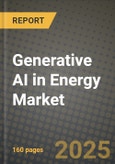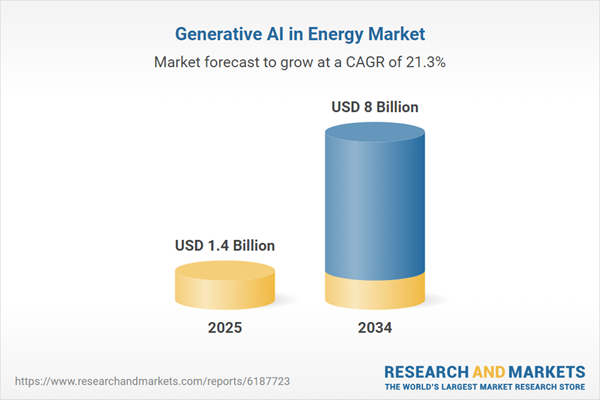Market Overview of Generative AI in Energy Market
The Generative AI in Energy market is experiencing significant growth as energy companies explore advanced technologies to optimize operations and enhance efficiency. Generative AI, which refers to machine learning models that can generate data, design solutions, and predict outcomes, is transforming the way energy systems are managed. In particular, AI is being utilized for energy forecasting, predictive maintenance, grid optimization, and resource allocation. With the growing focus on renewable energy sources and the global push for sustainability, generative AI is helping organizations to harness data from various sources, improve decision-making processes, and reduce operational costs. As energy grids become increasingly complex and interconnected, AI's ability to automate and predict various energy demands and supply conditions has proven invaluable. Additionally, the integration of AI into the energy sector can enable companies to meet sustainability goals by maximizing the efficiency of energy production and reducing waste. As a result, generative AI is expected to play a crucial role in the evolution of the energy industry, especially in managing the transition to a more sustainable and efficient energy future.The Generative AI in Energy market witnessed significant developments, with energy companies becoming more comfortable with the potential of AI-driven solutions. Key advancements included the growing use of AI algorithms to optimize energy consumption, reduce carbon footprints, and improve grid management. Energy firms increasingly adopted AI-powered tools for real-time monitoring and predictive maintenance, ensuring that equipment operates optimally and that downtime is minimized. Machine learning models were employed to predict demand patterns and adjust energy production accordingly, leading to better utilization of resources. Moreover, AI's application in renewable energy, particularly in wind and solar power generation, gained momentum. AI tools were used to forecast weather conditions and optimize energy output based on real-time data, improving efficiency and reducing waste. Additionally, energy trading companies started integrating generative AI to analyze vast amounts of market data and improve decision-making processes in buying and selling energy. These developments demonstrate the growing recognition of generative AI's transformative potential within the energy sector.
The Generative AI in Energy market is expected to continue evolving, with innovations that will further revolutionize the energy sector. One key development will be the deeper integration of AI into grid management systems, enabling smarter, more resilient grids that can autonomously adapt to changing conditions and optimize energy flow. Generative AI is likely to be crucial in managing the growing complexity of distributed energy resources, such as microgrids, decentralized solar power systems, and battery storage solutions. Additionally, as the energy sector seeks to address the challenges of energy storage and efficiency, AI-driven solutions will help enhance the performance of energy storage systems and improve the integration of renewable energy sources into the grid. The development of AI-powered digital twins for energy systems will allow companies to simulate and test different scenarios, leading to better decision-making and improved system design. Furthermore, with the rise of carbon-neutral goals and increasing regulatory pressure, generative AI is expected to play a key role in enabling the energy sector to meet sustainability targets while maintaining profitability. The next few years will likely see an accelerated adoption of AI tools to tackle global energy challenges.
Key Insights: Generative Ai In Energy Market
- Increasing use of AI-powered optimization for energy consumption, leading to more sustainable and efficient energy use.
- Adoption of generative AI in real-time grid management, ensuring optimal energy distribution and grid reliability.
- Integration of AI-driven predictive maintenance for minimizing downtime and reducing operational costs.
- Growing application of generative AI in renewable energy forecasting, especially in wind and solar power generation.
- Development of digital twins for energy systems to simulate various scenarios for better decision-making and design optimization.
- The need to optimize energy production and consumption to meet sustainability and environmental goals.
- Advancements in AI technologies enabling faster, more accurate decision-making in energy management.
- The growing complexity of energy grids and systems requiring intelligent automation for efficient operation.
- The push for renewable energy integration and the need for improved forecasting and resource management.
- Ensuring data security and privacy while implementing AI-driven solutions in critical energy infrastructure, particularly with increased digitalization.
Generative Ai In Energy Market Segmentation
By Component
- Solutions
- Services
By Application
- Demand Forecasting
- Renewable Energy Output Forecasting
- Grid Management and Optimization
- Energy Trading and Pricing
- Customer Offerings
- Energy Storage Optimization
- Other Applications
By End User
- Energy Transmission
- Energy Generation
- Energy Distribution
- Utilities
- Other End Users
Key Companies Analysed
- Google LLC
- Microsoft Corporation
- Engie SA
- Enel Green Power S.p.A.
- Huawei Technologies Co. Ltd
- Amazon Web Services Inc
- Siemens AG
- General Electric Company
- Intel Corporation
- International Business Machines Corporation
- Deloitte Touche Tohmatsu Limited
- Cisco Systems Inc
- Schneider Electric SE
- Honeywell International Inc.
- Flex Ltd
- ABB Ltd
- Duke Energy Corporation
- Nvidia Corporation
- Atos SE
- Zen Robotics Ltd
- Freshworks Inc.
- C3 AI Inc
- Databricks Inc
- AppOrchid Inc
- Verdigris Technologies
- Ecube Labs Co. Ltd
- Bidgely Inc
Generative Ai In Energy Market Analytics
The report employs rigorous tools, including Porter’s Five Forces, value chain mapping, and scenario-based modeling, to assess supply-demand dynamics. Cross-sector influences from parent, derived, and substitute markets are evaluated to identify risks and opportunities. Trade and pricing analytics provide an up-to-date view of international flows, including leading exporters, importers, and regional price trends.Macroeconomic indicators, policy frameworks such as carbon pricing and energy security strategies, and evolving consumer behavior are considered in forecasting scenarios. Recent deal flows, partnerships, and technology innovations are incorporated to assess their impact on future market performance.
Generative Ai In Energy Market Competitive Intelligence
The competitive landscape is mapped through proprietary frameworks, profiling leading companies with details on business models, product portfolios, financial performance, and strategic initiatives. Key developments such as mergers & acquisitions, technology collaborations, investment inflows, and regional expansions are analyzed for their competitive impact. The report also identifies emerging players and innovative startups contributing to market disruption.Regional insights highlight the most promising investment destinations, regulatory landscapes, and evolving partnerships across energy and industrial corridors.
Countries Covered
- North America - Generative Ai In Energy market data and outlook to 2034
- United States
- Canada
- Mexico
- Europe - Generative Ai In Energy market data and outlook to 2034
- Germany
- United Kingdom
- France
- Italy
- Spain
- BeNeLux
- Russia
- Sweden
- Asia-Pacific - Generative Ai In Energy market data and outlook to 2034
- China
- Japan
- India
- South Korea
- Australia
- Indonesia
- Malaysia
- Vietnam
- Middle East and Africa - Generative Ai In Energy market data and outlook to 2034
- Saudi Arabia
- South Africa
- Iran
- UAE
- Egypt
- South and Central America - Generative Ai In Energy market data and outlook to 2034
- Brazil
- Argentina
- Chile
- Peru
Research Methodology
This study combines primary inputs from industry experts across the Generative Ai In Energy value chain with secondary data from associations, government publications, trade databases, and company disclosures. Proprietary modeling techniques, including data triangulation, statistical correlation, and scenario planning, are applied to deliver reliable market sizing and forecasting.Key Questions Addressed
- What is the current and forecast market size of the Generative Ai In Energy industry at global, regional, and country levels?
- Which types, applications, and technologies present the highest growth potential?
- How are supply chains adapting to geopolitical and economic shocks?
- What role do policy frameworks, trade flows, and sustainability targets play in shaping demand?
- Who are the leading players, and how are their strategies evolving in the face of global uncertainty?
- Which regional “hotspots” and customer segments will outpace the market, and what go-to-market and partnership models best support entry and expansion?
- Where are the most investable opportunities - across technology roadmaps, sustainability-linked innovation, and M&A - and what is the best segment to invest over the next 3-5 years?
Your Key Takeaways from the Generative Ai In Energy Market Report
- Global Generative Ai In Energy market size and growth projections (CAGR), 2024-2034
- Impact of Russia-Ukraine, Israel-Palestine, and Hamas conflicts on Generative Ai In Energy trade, costs, and supply chains
- Generative Ai In Energy market size, share, and outlook across 5 regions and 27 countries, 2023-2034
- Generative Ai In Energy market size, CAGR, and market share of key products, applications, and end-user verticals, 2023-2034
- Short- and long-term Generative Ai In Energy market trends, drivers, restraints, and opportunities
- Porter’s Five Forces analysis, technological developments, and Generative Ai In Energy supply chain analysis
- Generative Ai In Energy trade analysis, Generative Ai In Energy market price analysis, and Generative Ai In Energy supply/demand dynamics
- Profiles of 5 leading companies - overview, key strategies, financials, and products
- Latest Generative Ai In Energy market news and developments
Additional Support
With the purchase of this report, you will receive:- An updated PDF report and an MS Excel data workbook containing all market tables and figures for easy analysis.
- 7-day post-sale analyst support for clarifications and in-scope supplementary data, ensuring the deliverable aligns precisely with your requirements.
- Complimentary report update to incorporate the latest available data and the impact of recent market developments.
This product will be delivered within 1-3 business days.
Table of Contents
Companies Mentioned
- Google LLC
- Microsoft Corporation
- Engie SA
- Enel Green Power S.p.A.
- Huawei Technologies Co. Ltd.
- Amazon Web Services Inc.
- Siemens AG
- General Electric Company
- Intel Corporation
- International Business Machines Corporation
- Deloitte Touche Tohmatsu Limited
- Cisco Systems Inc.
- Schneider Electric SE
- Honeywell International Inc.
- Flex Ltd.
- ABB Ltd.
- Duke Energy Corporation
- Nvidia Corporation
- Atos SE
- Zen Robotics Ltd.
- Freshworks Inc.
- C3 AI Inc.
- Databricks Inc.
- AppOrchid Inc.
- Verdigris Technologies
- Ecube Labs Co. Ltd.
- Bidgely Inc.
Table Information
| Report Attribute | Details |
|---|---|
| No. of Pages | 160 |
| Published | October 2025 |
| Forecast Period | 2025 - 2034 |
| Estimated Market Value ( USD | $ 1.4 Billion |
| Forecasted Market Value ( USD | $ 8 Billion |
| Compound Annual Growth Rate | 21.3% |
| Regions Covered | Global |
| No. of Companies Mentioned | 27 |









